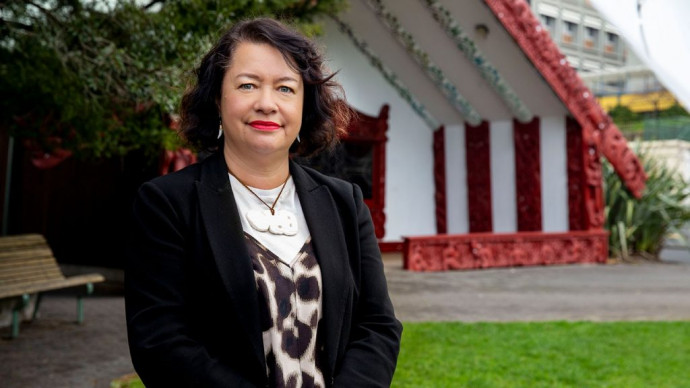Research
Published 20 November 2020Honour for Ngarino Ellis: carving out new histories

The importance of Māori art history has been recognised in a Royal Society Te Apārangi Early Career Research Excellence Award in the Humanities for Associate Professor Ngarino Ellis (Ngāpuhi, Ngāti Porou) from the University of Auckland
Originally published on 18 November 2020 on the University of Auckland News website
As the only Māori art historian employed at tertiary level in Aotearoa, Dr Ellis has pioneered the study of Māori art and culture from around 800 to the present, focusing in particular on pre-1900 art; especially tribal carving, moko signatures, personal adornment and identity.
Her award-winning publication, A Whakapapa of Tradition: One Hundred Years of Ngāti Porou Carving 1830-1930 (AUP 2016), examines how and why a fundamental evolution in Māori carving took place across a hundred years, and is considered a landmark volume in the history of writing about Māori art.
Dr Ellis describes her work as a “detective trail, with the joy and thrill of discovery” and is delighted this award celebrates the importance of Indigenous art history.
“I look forward to this being reflected in research and teaching and the targeted employment of Māori researchers in this area. My mahi is one small part of a growing field of Māori and Indigenous art histories and it’s a great time to be a writer when museums are welcoming us with open arms.”
Her methods, which include listening to oral histories and laments and deciphering stories embedded in wood and on skin, demonstrate the different ways indigenous researchers do their practice, and she’s looking forward to those methods, and Māori art history in general, reaching out to the rest of the world.
My mahi is one small part of a growing field of Māori and Indigenous art histories and it’s a great time to be a writer when museums are welcoming us with open arms.
“Working in this field fills me with such passion and excitement. I imagine a time when my students become my colleagues, and together we shape a world in which our taonga are connected once more and are revitalised as much as they revitalise us. The Royal Society’s continued awards and funding can help us realise this dream.”
She says to be recognised nationally is humbling and a result of many people championing her within the Faculty of Arts, including Dean of Arts, Professor Robert Greenberg, who is thrilled with this recognition.
“This award is a testament to the groundbreaking work Ngarino has done in the exciting field of Māori art history, where there is so much yet to discover, and which is so significant for our understanding of Aotearoa’s past,” he says.
Dr Ellis' current research focuses on Māori body adornment, a Marsden-funded project that will examine how adornments made from materials like wood, bone, shell and feathers were worn on the body, what this reveals about the social, economic and political aspects of Māori communities of the past, and their significance for Māori into the future.
Indigenous biography and art crime, in particular the theft of Māori culture, are two other areas of interest and expertise.
Associate Professor Ellis will receive her award this evening at the Auckland Museum, alongside two University of Auckland colleagues from the Faculty of Science.
Additional information: University of Auckland News
RESEARCHER
Associate Professor Ngarino Ellis
ORGANISATION
University of Auckland
FUNDING SUPPORT
Marsden Fund
CONTRACT OR PROJECT ID
UOA1922: 'Nga Taonga a Wharawhara: The World of Maori Body Adornment'
